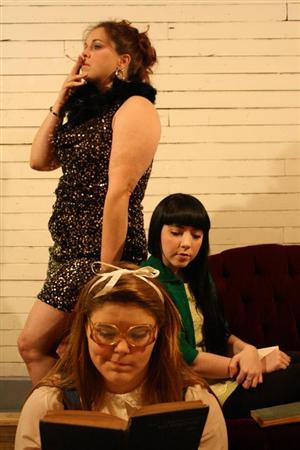The Effect of Gamma Rays on Man-in-the-Moon Marigolds, a Pulitzer-winning 1964 play written by Paul Zindel, came to the Murfreesboro Little Theatre on the weekends of April 19-21 and April 26-28 to plant an unsettling seed in the stomachs of its audience. The mustiness, creaks and general haunted charm of the 51-year-old theater appropriately set off the dismal tone of this sleeper production about personal failure, human value—if that’s real—and maybe hope when there isn’t any.
Directed and produced by Shane Lowery, the quietly eerie Effect of Gamma Rays is set mainly in the small home of single mother Beatrice, played by Jamie Storvik, and her two daughters, Tillie (Marian Storvik) and Ruth (Laura Frizzell), all struggling in the clutches of needling personal demons.
The characters spell dysfunction. There’s the depressed and abusive mother who comes off like a more neurotic and ill-intentioned version of The Glass Menagerie’s Amanda Wingfield, driven half crazy by her lack of success and the smallness of her life. There’s the conniving but fragile Ruth, both at odds with and seeking the approval of her mother. And then there’s pitifully meek Tillie, the target of her mother’s, sister’s and classmates’ ridicule and also the play’s sole grain of hope.
With her girls’ father long gone, Beatrice’s bitterness has chipped away at her sanity. Despairing, tortured by unrealized dreams and feeling the weight of responsibility for her daughters and an elderly and unresponsive boarder, Nanny (a role both pitiful and comic played by Susanne Tenpenny), Beatrice preys upon her daughters. She is seemingly embarrassed by Ruth and bent on belittling Tillie as the girl works on a science project, which is a study of marigolds grown after exposure to radiation.
Frizzell as Ruth is the most interesting to watch, troubled and unbalanced, one minute a coy and simpering vixen manipulating mother and sister, the next a little girl clamoring for her mother’s affection. Storvik as Beatrice is at once detestable as a bully and a creature to feel sorry for as she reminisces about what she used to be. Hope seeps through the cracks only through Marian Storvik’s slip of a voice as the sheltered and mousy Tillie. Her radiation-affected marigolds, while deformed, bloom large and beautiful, and as the play progresses and Tillie throws herself into preparation for the science fair, it feels as though the entire future of the family depends on her winning.
The characters’ retelling of dreams and nightmares punctuates the play, illustrating what is real now and what used to be for Tillie, Ruth and Beatrice and explaining what’s most important to them. The Little Theatre is really little, seating about 30, and it was filled on the first Friday and Saturday showings. A few lines were flubbed, but the main actors were captivating as they embodied three incredibly diverse characters that clashed and each fit necessarily together as part of the puzzle. They make for a tragic little family unit that simultaneously evokes pity, repugnance and desperation as they drown within the sort of doomed family dynamic that made The Glass Menagerie at once so beautiful and difficult to read and watch.













